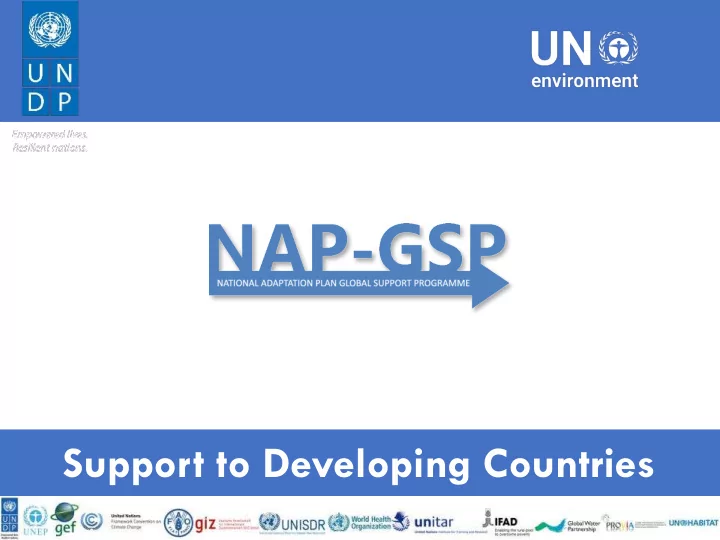

Support to Developing Countries
Program institutional arrangements UNFCCC process (CoP, AC) Technical Advisory Group Project Board UNEP, UNDP, AC, GEF Sec, UNFCCC Sec, CGE, UNDP, UNEP, GEF Sec Reps from reg ional grouping, NAP-GSP partners (WHO, UNITAR, IFAD, FAO…) Technical Support Unit Lead Technical Specialist, Technical Specialist, KM Specialist, Project assistant
UNDP/UN Environment NAP-GSP: Overview and project milestones 2013-2015 NAP-GSP Support for LDCs USD 2 million from the LDCF Supporting LDCs on NAP Processes 2015-2018 NAP-GSP for non-LDCs USD 4.5 million from SCCF Programme expanded to assist non-LDCs with NAP processes 2016-2019 NAP-GSP for LDCs (expanded) USD 6 million from LDCF To expand support towards building technical capacity of LDCs
What does the NAP-GSP do? Programme Objective: To strengthen institutional and technical capacities for iterative development of comprehensive NAPs. Supports requesting countries with one-on-one technical assistance on demand to get started on the NAP process Sensitizes national teams on tools to support key steps of the NAP process through regional trainings Facilitates exchange of lessons and knowledge through South-South and North-South cooperation
UNDP/UN Environment NAP-GSP: Key achievements Seven Regional Training Workshops in Africa, Eastern Training assistance provided to 96 Europe and Central Asia, Asia & countries globally Pacific and Latin America Total of more than 260 people Country missions to 32 countries participated in Regional Training across Asia & Pacific, Latin Workshops from Ministries of America, Africa, Eastern Europe Environment, Planning and Finance and Central Asia Partnerships forged and ‘Peer-to-Peer Buddy System’ knowledge networks forged for enhancing south-south strengthened – including APAN, knowledge exchange in Africa, AAKNet, REGATTA Asia & Pacific and Latin America
PLANNED SUPPORT ACTIVITIES, 2017 & 2018 Countries are further capacitated to advance medium to long-term adaptation planning processes in the context of their national development strategies and budgets
Outcome 1 Technical support (country-level) Target: 20 non-LDCs Outcome and 20 LDCs receive 1 tailored support to advance their NAP Developing countries have capacity process to advanced medium to long-term adaptation planning processes in the context of their national development strategies and budgets Target: Access to GCF (UNDP) NAP support facilitated
Outcome 2 Technical support (regional trainings) Target: 10 regional workshops for non-LDCs and 6 targeted Outcome workshops for LDCs 2 Target: At least 300 national technicians from non-LDCs and 144 from LDCs trained in the use Technical capacity to support key steps of the National Adaptation of tools and methods to advance Plan process is developed and the NAP process relevant tools and methods are accessible to all developing (at least 30%-40% women). countries. (UN Environment) Target: At least 5 training materials for non-LDCs and 2 for LDCs developed and published online .
Outcome 3 Knowledge brokering Target: Documentation of NAP process of at least Outcome 20 LDCs that received one-on-one support Target: Case studies and analyses on integrating 3 NAPs, NDCs, and SDG outcomes Target: Undertake needs/gap assessments Lessons and knowledge sharing continually, preferably with LEG through South-South and North- South cooperation to enhance Target: share result of analysis and best practices international and regional through at least 6 knowledge- sharing cooperation to formulate and advance NAP process. systems/platforms (UNDP and UNEP)
Significance of Developing a NAP • comprehensive on content, capacities(human, institutional, systemic), identification of steps for implementation • helps identify adaption priorities and options • enables linking to financing/budgeting and long-term development planning and priorities • iterative process
Challenges and Solutions Challenges: • capacity needs evolve overtime • institutionalizing capacity • lack of coordination between various planning frameworks further burden limited capacity • financing for: (a) technical assistance to formulate NAP (b) support follow-up formulation and implement NAP (c) develop investment-ready projects Solutions: • training modules/tools on finance, prioritization of options, sectoral approaches • data and climate information: initiatives engaging the insurance industry • situate small capacity building initiatives in transformational context, linking to long-term development planning and priorities • adopt a continuum approach from planning, to developing implementation strategy, to large-scale programming • facilitate coherence and integrated approach between planning frameworks (e.g. NAPs, NDCs, and SDGs) • facilitate peer-to-peer exchange • exploring ways to empower direct access entities
Financing Preparing at national level to access finance • Involve of finance ministries • Cost out actions • Develop NAP funding strategies (preferably along with other funding strategies such as SDGs) • Review the climate finance landscape (tool, CPEIR) • Exploring possibilities for blending public, private, international sources • Incentivizing private investment Available support (technical and financial) • LEG and LEG secretariat • LDCF, SCCF through NAP GSP • LDCF, SCCF directly supporting countries • GCF Readiness window NAP allocation (up to $3 million) • Bilateral/development agencies support (e.g. GIZ) • Domestic • NAP Global Network • Adaptation programming such as AF, GCF, GEF
Links to UNFCCC processes and entities Adaptation Committee LDC Expert Group Nairobi Work Programme NAP-Expo, COPs and inter-sessionals
Further information on NAP-GSP http://globalsupportprogramme.org/nap-gsp Prakash Bista Gelila Terrefe Technical Specialist Senior Country Support Specialist UNEP-ROAP/NAP-GSP UNDP-GEF/NAP-GSP bista5@un.org gelila.terrefe@undp.org Angela Lentisco Esther Lake Rohini Kohli Adaptation Specialist Knowledge Management Specialist Lead Technical Specialist UNEP-ROAP/NAP-GSP NAP-GSP UNDP-GEF/NAP-GSP lentisco@un.org esther.lake@undp.org rohini.kohli@undp.org Grzegorz Wesolinski UNEP-ROAP/NAP-GSP wesolinski@un.org Mozaharul Alam Srilata Kammila Regional Climate Change Coordinator Regional Technical Advisor- Adaptation UNEP-ROAP UNDP-GEF mozaharul.Alam@unep.org srilata.kammila@undp.org
Recommend
More recommend